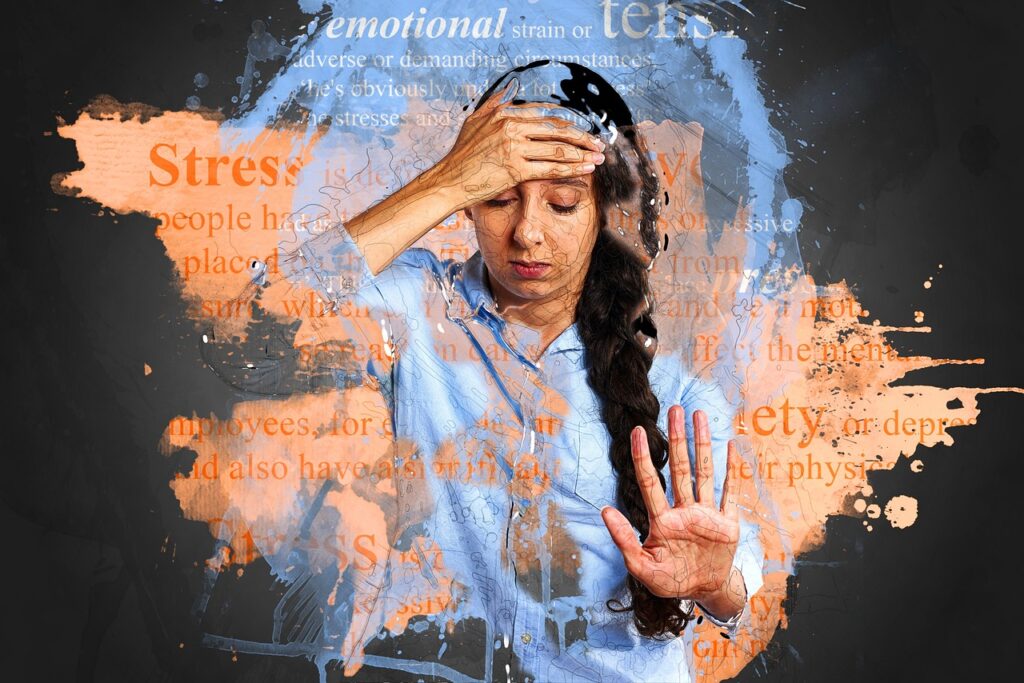Stress is a common experience that can affect everyone at some point in their life. Work, relationships, health problems, financial troubles, and more can cause it. The good news is that there are many ways to manage stress and reduce its impact on your life.
What is Stress?

Stress is how we respond to a state of worry or mental tension caused by a difficult situation, perceived threats, and challenges. Stress is evident due to conditions that overwhelm us in our daily lives, prompting us to respond with what is called the fight or flight response. In a stressful situation, our bodies release stress hormones like cortisol and adrenaline, preparing us to manage the perceived threat. What needs to be understood is how there are different types of stress ranging from physical to mental and emotional stress. Physical activity, health conditions, work-life challenges, or mental distress could cause these.
Stress, to a certain extent, is good for you; it can motivate you to work harder, be more focused, and enhance your performance. Too much stress, if unchecked, becomes bad. This is when chronic stress makes you jittery and harmful to your health, resulting in conditions like anxiety, confusion, fatigue, lax performance, and sometimes even burnout and depression. How we respond to the various types of stress makes a big difference, which is why recognizing and effectively managing stress is essential for overall well-being and resilience.
The Difference Between Anxiety and Stress
Both stress and anxiety are emotional responses activated by the same cognitive physiology, which includes the amygdala, hippocampus, and prefrontal cortex. This is why there is a thin line between stress and anxiety. Stress is caused by external short-term triggers such as workload, deadlines, financial problems, life challenges, relationship conflicts, and illness. Such stress can be managed, but if mismanaged, it can cause both mental and physical issues like anger, fatigue, irritability, chronic pain, insomnia, and poor digestion.
Anxiety is more a long-term disorder characterized by excessive worry, fear, and depression, even when there are no stress triggers. Anxiety, too, can lead to the same physical problems caused by stress; however, in anxiety, there is a bigger risk of panic attacks, depression and other mental disorders.
Ways to Manage Stress
While chronic stress, burnout, and more severe forms of stress that might be impacting mental health need professional evaluation and therapy, regular stress can be easily managed to reduce its impact on your life. These ten ways to handle stress can also be incorporated into your stress management routine combined with your therapy.
Practice Mindfulness

Mindfulness is the practice of being present in the moment and fully engaged in your surroundings. It can help to reduce stress and anxiety by allowing you to focus on the present and let go of negative thoughts and worries. Try practicing mindfulness through meditation, yoga, or other relaxation techniques. Studies have found how mindfulness meditation influences the body’s stress neural pathways by altering brain structure and activity associated with emotional regulation and attention. Mindfulness can also reduce stress, anxiety, and depression.
Exercise Regularly
Exercise is among one of many ways to manage stress and improve your physical health. It releases endorphins, which are chemicals in the brain that help to reduce pain and promote feelings of well-being. Try to get at least 30 minutes of moderate exercise every day, such as walking, jogging, or cycling. According to common scientific guidelines, every adult needs 150 minutes of moderate-intensity aerobic activity per week, 75 minutes of vigorous activity, or even a combination of both. Additionally, one should aim for two days of strength-based exercises (resistance or weights) at least twice a week.
Get Enough Sleep
Sleep is essential for both physical and mental health. Lack of sleep can cause stress and anxiety, so it’s important to get enough rest each night. Try to aim for 7-8 hours of sleep per night, and establish a consistent sleep routine to help your body adjust.
Good sleep habits include:
- Going to bed and waking up at the same time every morning is good for your body’s circadian rhythm.
Create a good sleeping environment where it is dark, quiet, and at a comfortable temperature
Avoid using electronic devices one hour before sleep
Avoid large meals and caffeine at bedtime
Being physically active during the day ensures better sleep at night.
Connect With Others
Connecting with others can help to reduce stress and improve your mood. Spend time with friends and family, or join a support group to connect with others who may be going through similar experiences.
Practice Relaxation Techniques
Relaxation techniques, such as deep breathing, meditation, and yoga, can help to reduce stress and promote feelings of calmness and relaxation. Try incorporating these techniques into your daily routine to help manage stress.
Take Breaks
Taking breaks throughout the day can help to reduce stress and improve productivity. Take short breaks to stretch, walk around, or engage in other activities that help to relax your mind and body.
Manage Your Time Effectively
Poor time management can cause stress and anxiety, so it’s important to learn how to manage your time effectively. Make a schedule or to-do list to help you prioritize tasks and break larger tasks into smaller, more manageable steps.
Practice Self-Care
Self-care is important for both physical and mental health. Take time each day to do things that make you feel good, such as taking a bubble bath, reading a book, or going for a walk.
Set Realistic Expectations
Setting unrealistic expectations for yourself can cause stress and anxiety. Be realistic about what you can accomplish, and don’t be too hard on yourself if you don’t meet all your goals.
Eat a Healthy Diet
Eat a healthy and balanced diet of veggies, fruits, healthy fats, and protein. Fruits and veggies are rich in vitamins and minerals like copper, zinc, Vitamins E, A and C, all good for stress. Add healthy fiber foods and ensure an adequate amount of healthy fats that give you omega 3’s, good for anxiety and cognitive function. Avoid processed food and unhealthy fats that can increase stress. As for caffeine, there is a mixed opinion, and several people swear by the morning cup of coffee. Indeed, caffeine does increase cortisol to gear you up for your tasks at hand, but research has also shown how caffeine might not be a good idea if you also suffer from panic attacks and anxiety.
READ: Teenage Stress: 5 Easy Ways How Teenagers Can Manage Stress Effectively
Seek Professional Help
If you’re experiencing chronic stress or anxiety, it’s important to seek professional help. A mental health professional can help you to identify the causes of your stress and develop strategies for managing it. Stress is a common experience that can be managed with the right strategies and support. Practice mindfulness, exercise regularly, get enough sleep, connect with others, and follow the advice outlined in this article. Armed with these ways to manage stress and knowing when to seek professional will help you learn to handle stress and live a balanced, healthy life.
